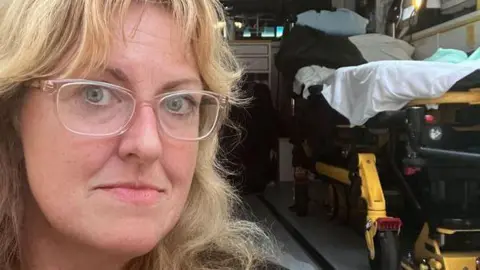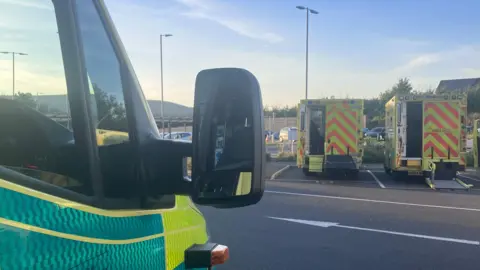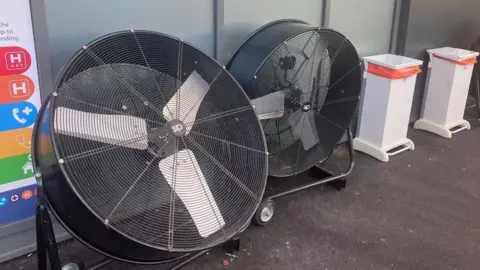BBC reporter's 8-hour wait outside A&E in ambulance
 BBC News
BBC NewsAs a journalist Colette Hume is used to hearing about long ambulance waits but on Monday night she had first-hand experience. Here is her account of what happened.
I'm sitting in the back of an ambulance outside the emergency department at the Grange University Hospital in Cwmbran.
I am trying to count the number of ambulances...11, 12, 13, no... 14, is that 15? All have patients onboard, all waiting for a bed.
I've waited eight hours with my partner's father in the back of an ambulance after he suffered a stroke on Monday.
It comes less than 24 hours after the first minister Eluned Morgan said she wants to hold NHS bosses to account over long waiting lists.
The ambulance was called just after 10:00 BST and he was brought to the hospital just after 12:30.
As I sit with him his blood pressure is high, 156 over 114. An ambulance technician adjusts the cuff around his upper arm. Observations are taken and passed on.
By the time he is seen by doctors, he has already been lying in the ambulance for more than two hours.
He is taken into a side room just across the hall from resuscitation.
On the plastic panelled wall there are six showers with seats below. "What’s this?," I ask.
"It's the decontamination room. If people have been covered in chemicals or fallen into a river, they come in here to be hosed down. Us too," says the paramedic.
It's the only room available. This is the room where we're told: "It's a stroke."
But that shocking diagnosis doesn't mean he gets a bed. Instead, it's back to the ambulance to wait to be called for a brain scan.
Another hour ticks by. The blood pressure monitor flashes red.
"This isn't what I joined the service to do," another paramedic tells me.
"This is primary care." He nods when I ask if he feels like an overqualified healthcare worker.
 BBC News
BBC NewsThe paramedics I speak to have decades of experience but said their skills are being dulled by the hours they spend sitting outside this hospital.
"If we're not out there doing the big jobs, you lose that edge. Sometimes when something big does come in I worry I won't remember what to do, I won't be sharp," he tells me.
Finally, we're called for the brain scan, which is carried out in minutes.
I catch snippets of a conversation between other paramedics. A patient aged more than 100 years old is in one of the ambulances.
At 19:00 the paramedics and technicians begin to swap shifts, handing over their patients to their colleagues who will work through the night.
"I don't want to see you tomorrow," one paramedic tells me.
"Sometimes we come back on shift the next day and the same patient is still in the ambulance we left them in. It's dreadful.
"We go home so depressed. You're tired from just waiting. So many people are leaving the job."
There's a fuggy, dense smell of diesel lying heavy in the air. I notice huge industrial fans and think they are there because of the promised warm weather.
The paramedics think my theory is funny, "That's for the fumes," they tell me.
"We all go off shift with cracking headaches, feeling sick breathing all this in. Give it 10 or 15 years and there'll be loads of claims for Chronic obstructive pulmonary disease (COPD)", he says.
 BBC News
BBC NewsWhile the frail, ill and old lie outside in the ambulances, those who couldn't or didn’t need an ambulance are inside, some spilling out onto the pavement.
A teenage boy, wearing a rugby kit and caked in mud with what looks like a dislocated shoulder walks in with an older man. A woman in gym gear limps past.
"They should go to the minor injury unit," the paramedic says.
There are two - one at Neville Hall Hospital in Abergavenny, another at the Royal Gwent in Newport.
"So why don't they?," I ask.
"Maybe they don't know about them. They're going to be hours here," he says.
All the staff I speak to say the lack of social care is the main reason so many hours are spent waiting here, but they say difficulties in getting GP appointments can also mean some people turn in desperation to the ambulance service and hospitals.
The paramedics and technicians work a 48 hour week of four twelve hour shifts.
"How much of that time do you think you spend waiting here?," I ask.
"About half," comes the reply, with a soft shake of the head.
More time passes and with the blood pressure monitor still showing numbers far higher than we would like, I gently ask if maybe I should try to ask the triage staff if a space on a ward is any closer.
"You can, but I doubt you'll get anywhere," comes the reply.
He offers to check a monitor just inside the emergency ambulance entrance.
"According to this," he tells me "you're the longest wait."
It's not a title either of us want.
But the lady with the displaced hip has priority - unless another emergency comes in - which it does.
Every space is taken by an ambulance or crew car, but a channel is left and it's here that this new ambulance heads for.
A man, possibly in his thirties is wheeled into resus. His arm flops over the side of the trolley, at his side are machines flashing, his face is covered by a mask but I can see his complexion is grey.
Things could be worse. A lot worse.
A nurse with a kind face and a clipboard comes out. It's been more than seven hours now and she's checking on the patients.
I gently ask if the bed might be available soon. The answer is a weary no.
"You're better off out here in the ambulance," she tells me.
She says every part of the emergency department is full, more than 140 patients need treatment.
Finally at 20:18 pm comes the news that there is a bed.
But he's so cold from hours sitting in the ambulance it's hard for the nurses to do the observations.
But he has a bed. The nurse can see the relief we feel.
"Go home. Get some rest," she tells me. "He's safe here now."
Figures from a recent Freedom of Information request to BBC Wales revealed more than 2,000 ambulances spent more than four hours outside A&Es in Wales waiting to hand over patients in May.
There have been 1,700 ambulances a month waiting more than four hours outside A&Es over a 12-month period.
The average handover time was 2hrs 11 minutes in May.
Lee Brooks, the Welsh Ambulance Service's executive director of operations, said: "The issue and consequence of patient handover delays outside hospital emergency departments is well reported, as is the cause."
He said they did not accept that handover delays were the "new normal" and were "working hard to find solutions to the challenges as well as looking at evolving our current service model further".
Mr Brooks said that by actively looking at what they could do "to use the skills of our people differently", they could ensure fewer patients needed to travel to hospital so they could be cared for more effectively at home or in the community.
A spokesman for Aneurin Bevan University Health Board said that like other health boards across Wales and the rest of the UK they were under severe pressure due to large amounts of very poorly people attending their hospitals and difficulties with discharging patients who no longer need hospital-based care.
"In turn, these delays are affecting the overall flow of patients through our hospitals and are unfortunately causing long waits in our emergency department and for ambulances.
"However, every patient is seen on arrival by staff trained to assess the seriousness of the patient's condition, and those requiring the most urgent, life-saving treatment are always prioritised.
"We are continuing to work with our colleagues in the Welsh Ambulance Services NHS Trust to ensure the timely transfer of patients from their ambulance into our care so we can release ambulance crews as quickly as possible to enable them to respond to emergency calls in our community."
